![]()
The Words of the Masters Family
|
|
The Words of the Masters Family |
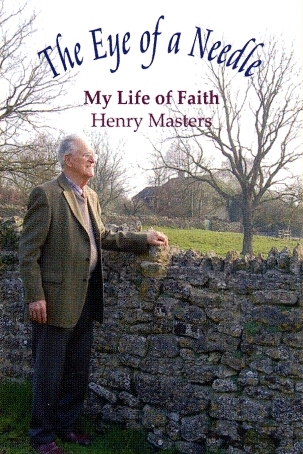
The
cover of Henry Masters' autobiography, from which these extracts are
drawn
Witnessed to by their daughter Rosalind, Henry and Avril Masters joined the Unification Church in the early 1970s. Years earlier, Henry Masters had inherited an estate of several hundred acres of land and buildings located in a picturesque village in southwestern England. In 1973, the Masters donated this estate in support of God's providence. True Parents were moved by this gesture of total offering. Henry and Avril found themselves working closely with True Parents on a number of projects over the ensuing years. Here are extracts from Henry Masters' story, which he recently completed as a full-length autobiography.
Rosalind had brought with her a book she wanted to share with us. It consisted of type written sheets in a spiral binder and was entitled "The Divine Principle." The author of the book was a Korean lady -- a Miss Young Oon Kim. Because of the deep love and concern that we had for our daughter, we wanted, desperately, to understand what it was that had captured her imagination and was, seemingly, taking her from us.
At first Avril was too busy preparing for the Christmas festivities to become involved in what Rosalind had to show but I could not wait. Rosalind and I began to read and we continued to read together for the whole of the two days she was with us. I simply could not put the book down. I sat down to the Christmas dinner with the family and carved the turkey but I could not eat anything. Rosalind too fasted with me that day. We had not finished reading the book when it was time for her to leave, so she left it with u saying only that we should not read the end before we got to it. Of course we did, but it in no way detracted from the message. Avril and I continued to read together for the next few days.
By no means do I remember the full content of this book but I do know that it had a very profound effect on us both. It spoke so positively about all the things which were most dear to us. It spoke about the centrality of love in our lives, about the importance of family and the sanctity of marriage. It touched on stewardship and about having a clear understanding of our relationship with all living things, and our responsibility for the Creation. It also spoke so clearly about the reality of the spirit world. The book told of the longing and hope of all people to be able to build a better world -- a Utopia -- a Kingdom of Heaven on Earth. A hope that is expressed by Jesus Christ in the Lord's Prayer, "Thy Kingdom come, Thy will be done, on earth as it is in Heaven." But I think that the concept that moved us the most at the time was the idea that, because man was created in the likeness of God, then God, like man, must be able to experience emotions God could experience not only love, anger, and joy, but also sorrow and pain. It touch and us very deeply to think of the painful heart of God as he sees our ignorance of Him and our disobedience to His will. The section on the Mission of Jesus also moved us deeply. We realized that these revelations were not the work of any ordinary person; they were truly inspired and deeply insightful....
As we began to study more deeply and to converse with our new-found friends, we found ourselves becoming more open to the spiritual world around us. I remember clearly walking down the street in Swindon and feeling that I was moving six inches above the pavement. I felt people turning and looking at me as I passed. I found myself walking down a footpath or across the fields and sensing the grasses reaching out to touch me. I could walk into a field where birds, which would normally scatter at the presence of a man, remained on the ground undisturbed.
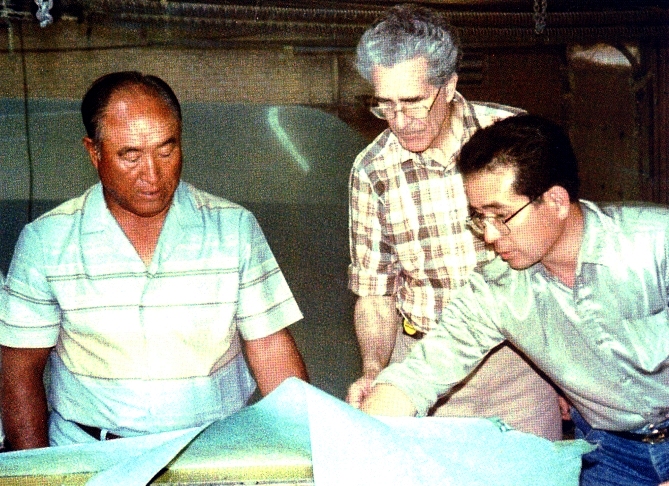
Father,
Henry Masters and Takeru Kamiyama look at boat plans; Father was
closely involved in the practical work.
Jesus had told the rich young ruler that it was easier for a camel to pass through the eye of a needle than for a rich man to enter the Kingdom of God. He recommended that the young man should sell all he owned and give it to the poor but the young man was unable to do this. We felt an overwhelming impulse from the spirit world to offer to God everything we had in absolute submission. We felt compelled to give not only our property, our home and our livelihood, but also our children and one another. A total offering of all that we loved most dearly was the least that we could give....
In April of that first year we had an invitation to go to the United States to attend a special Holy Day, the Day of All Things, and to meet Father and Mother Moon at their home at Belvedere in Tarrytown, New York....
We were invited to attend a special holy day celebration in the converted motor house on the Belvedere estate. Flags from around the world hung from the ceiling and the stage was bedecked with beautiful flower arrangements. On this occasion we were able to make our presentations to Father and Mother. Avril presented a table cloth that she had embroidered and I presented a small scroll on which I had drawn a map of the Estate. Father shook my hand enthusiastically while Mother bathed us with a beautiful smile. Some years later when the True Parents had moved to a more auspicious home at East Garden in Irvington and we were privileged to live in a little room in the roof at Belvedere, we found the table cloth on the table beside Father's bed.
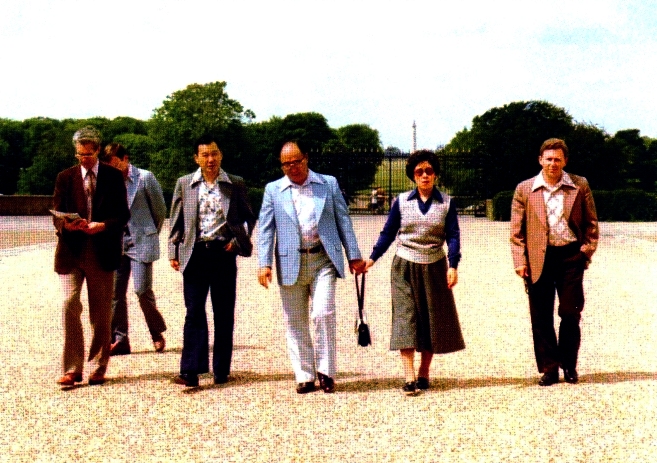
Henry
Masters and Colonel Han accompanying True Parents in 1974 at Blenheim
Palace, England, where Winston Churchill (1874-1965) was born. Also
present are two American security guards.
One of the first visits Father made was to Aberdeen in Scotland. Father wanted to meet a professor at Aberdeen University who had attended one or two of the Science Conferences. Father travelled to Edinburgh by plane and I met him at the airport there. After a brief visit to the Aberdeen Center, we went to the hotel where Father would be staying for a few days. While we were there, Father invited the professor to dinner and, for more than an hour, spoke to him through his translator, Colonel Han. Later Father was invited to take tea at the professor's home. He appeared very much at ease, sitting on the lawn, sipping tea with his host.
One part of our stay in this hotel was very precious to me. Father was playing pool, as he often did, in the hotel pool room when he noticed that I was not wearing a blessing ring. For some reason, special rings had not been given out at our particular Blessing. Father reached into his pocket and brought out a rather small ring. He fitted the ring on his little finger and then removed it and slipped it onto my finger, my pinkie finger. This was, to me, such an incredible blessing.
For Father's visit to Scotland, someone had arranged for the rental of a Land-rover with 4-wheel drive. Although it would have been ideal if we had been travelling over the Scottish moors and hills, it was not the height of luxury on paved roads and had a tendency to rock from side to side when negotiating bends. Before leaving Scotland, we drove down to our center at Dunbar, to the west of Edinburgh, where Father spoke to the members. As time went by I became acutely aware of the time it would take to reach the airport if he was to catch the last flight back to London. I rather rashly took it upon myself to stand up and announce that if we were to catch the flight, we should leave soon. Father appeared to be rather annoyed at being interrupted and continued to speak for another half hour. We then made a hurried exit.
The airport was, of course, on the other side of Edinburgh from Dunbar. Hamish Robertson, who knew his way around, led the way and I followed with Father in the Land-rover. I did not know my way around Edinburgh at all and was obliged to follow Hamish at high speed to avoid getting lost. The suspension on the Land-rover caused it to lurch from side to side at every bend. Father always sat on the right side of a car. So, with a right-hand drive, Father sat behind the driver. I was very much aware that, each time we negotiated a sharp corner, hands grabbed the back of my seat.
We eventually arrived at the airport some 30 minutes late for the flight. Father walked calmly into the airport and found the plane waiting for him. It left as soon as he was seated and returned him to London. Dennis Orme, who was at the airport already, had, it seems, been most insistent with the flight crew about the importance of the passenger they were waiting for....
While acting as Father's driver, I had to be ready, at any time, to leave immediately. I often had no idea of where we were going until we were already on the road. It might be to Devon or Cornwall or to a factory in East London, or simply to a Chinese restaurant in Soho. I was grateful for having a good sense of direction. We were followed everywhere by a second car with two American security brothers, Mike McDevitt and another guard. I knew of many shortcuts through central London but had always to make sure that Security was following.
I took very seriously the responsibility I had in carrying Father safely and comfortably. I rejected any inappropriate or negative thinking from my mind and thought only of good things. I endeavored to concentrate totally on how to drive most smoothly and safely, alert to everyone else on the road.
I was always very much aware of Father sitting in the seat behind me. I felt that he could read every thought that passed through my mind as he watched my hands on the steering wheel. I knew he could read my character and see every one of my limitations. When, as we sped down the motorway and I could hear the soft breathing of innocent sleep, I felt that I was cradling his life in my hands.
One day Father put me to the test. I was driving, either on the M4 or M3, travelling towards London, when Colonel Han, who was sitting beside me, said "Father wants you to drive faster." The speed limit on the motorways was 70 miles per hour. I was already travelling at 80, which was normal. I put pressure on the accelerator, 85. "Faster" came the voice from the back seat. Then 90, 95. "Faster, faster." We reached 100 miles per hour on the speedometer. We were passing everything on the road, weaving this way and that through the stream of traffic. Then "Ok -- you can slow down now." It took some while for the security car to catch up. Tears came to my eyes as I thought "How much Father trusts me; he trusts me with his life."...
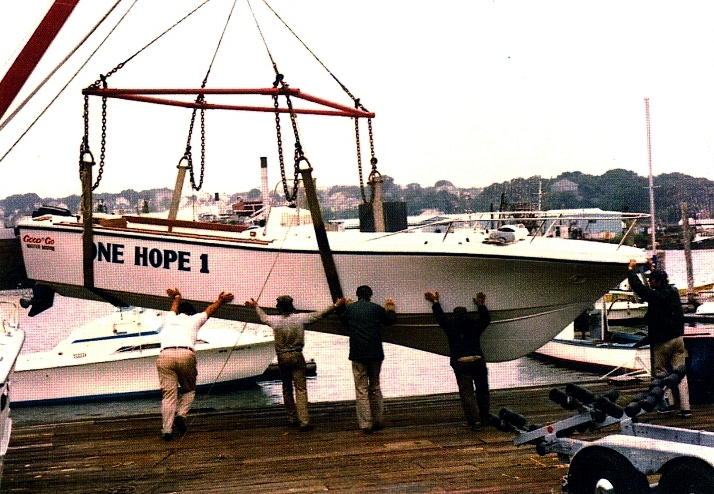
Launching
the first "Good Go" boat, One Hope 1, completed on July 10,
1980
On the Celebration Day [of True Father's 60th Birthday], Father spoke at length to a crowded Ballroom in the morning and he attended a special celebration at the Manhattan Center in the evening. During the afternoon, however, I received a message that Father wanted to see me in his fortieth floor apartment. He wanted a report on the boat design.
I took a roll of drawings under one arm and the model under the other and ascended to the fortieth floor. Father greeted me at the door and led me to a side room (the main part of the apartment was full of children). I showed Father the working drawings and gave a report on what we had been doing, but what Father really wanted to see, more than anything, was the model. This was our birthday offering. I had fitted out the model for various types of fishing which included outriggers that could be raised or lowered, a stern ramp and net reel, a mast with derrick and winches. It was by no means a professional model -- it was made with cardboard, plaster and sticks of wood -- but it served to show Father, three dimensionally, what the boat would look like and how it could be rigged for different types of fishing. Father was so happy with the result of our exercise. I felt that it meant so much to him on this very special day....
Father visited us almost every week to check on progress. Our working area was approached by a metal stairway leading down from the main floor of the building. The stairway had a loose tread at the top. We would all be working away industriously when there would be a clank as a foot trod on the top step and there was Father -- looking as if he had just alighted. He would then descend the steps to see how we were progressing. When the three-dimensional outline of the hull was clearly visible, Father made some fundamental adjustments to the lines. He described a rounded bow instead of a pointed one. This was to provide a valuable fishing platform and also establish a considerable overhanging flair which would help to keep the boat dry. Actually, it gave the boat a certain oriental flavor. He deepened and lengthened the foot of the bow stem so as to give a better cutting edge to slice through the waves. We then made further adjustments to the keel line to prevent "cavitation" from taking place.
The inspired improvements that Father made gave a totally new look to the boat. They gave the boat an appearance of purpose and urgency that was quite unique. They also greatly improved the performance. These were ideas that developed out of Father's observation, intuition and insight while fishing on the ocean.
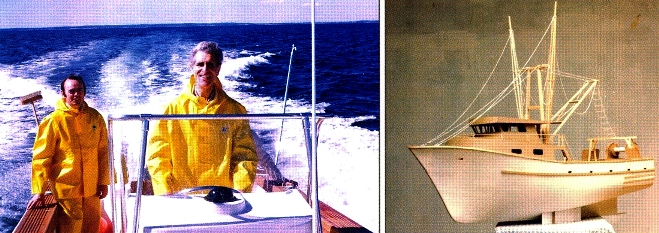
Left:
Brian Hill with Henry Masters as he pilots the One Hope 4 out to
present it to Father at sea; Right: The model of a seventy-eight-foot
fishing vessel that Henry Masters made for Father for his sixtieth
birthday.
The hull and deck plugs, together with some other boxes, were then covered with fiberglass and putty and were sanded and polished to give a perfect shiny surface. Molds were made from the plugs and boat parts were made from the molds.
A Norwegian brother, Geir Isaksson, had the responsibility of building a mold for a rope locker. It was an oddly shaped black lump but Geir had put his heart and soul into sanding and polishing it until it positively glowed. On one occasion, when Father was visiting, I led him into the side room where Geir was working. Father walked over to the mold and, without saying a word, he gently rubbed his cheek against the surface. Father's action said everything and Geir was totally elated....
The first One Hope: Brian and I flew up to Gloucester on the first flight in the morning. The boat was immediately taken down to the harbor, picked up by a crane and lowered into the water. No previous tests had been done so it was with great relief that we saw it sitting there in the water -- on an even keel. We filled the tank with fuel and climbed aboard. Brian started the engine, pushed the throttle forward and we glided across to a jetty on the other side of the harbor where Father and Mother were waiting. They immediately stepped on board and we set off for a test drive around the harbor. The performance was better than we dared hope. If Father had any reservations, he kept them to himself. This was Father's One Hope and the first of many to come.
A week or two later the fourth Good Go, the One Hope 4 came off the production line and was delivered to Gloucester. Brian and I received a call to meet with Father there. When we arrived, we found that Father was already out fishing on the New Hope, the boat that he had acquired some six years earlier and on which I had had the privilege of fishing with Father on my forty-eighth birthday.
We were told that Father was fishing with the fleet at a spot some twenty miles off shore. Neither of us had any experience of navigating at sea but we were told that, if we followed a course at a certain compass bearing, we would, in due time, meet up with the fishing fleet. It was a great relief when, after losing site of the coast, the fishing fleet finally appeared on the horizon.
Father observed with a keen eye the way the boat handled in the waves and, at the end of the day, he switched boats and returned home on the One Hope 4. Brian was at the helm. After a while Father beckoned me to follow him forward and we sat down together on a fish box. Father said "Congratulations!"
I replied "Father, this is your boat, your design." Father smiled a little coyly, studied his feet for a moment and returned to the stern of the boat.
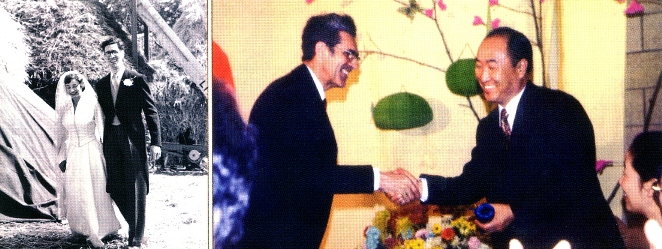
Left:
Henry and Avril after their wedding reception; Right: Presenting True
Father with a map of the estate he is donating to the church on the
Day of All Things, 1973
In September 1982 Father gave a speech at East Garden on "Why we have an Ocean Church." He spoke to the Ocean Church membership of the great hope he had in the development of Ocean Church as a testing ground for future leadership and about taking responsibility for America. I quote one paragraph:
"When I first met Mr. Masters, I noticed his hair was completely white and thought he was an old man. I treated him kindly and didn't push him too much. Then I found out he was only fifty-six and I thought, "Oh, I should have pushed him much more, he is only a young man! Why is this man here from Britain? Does he have a separate destiny from you? No, the world is only one world. America is not just by itself. We share whatever happens."